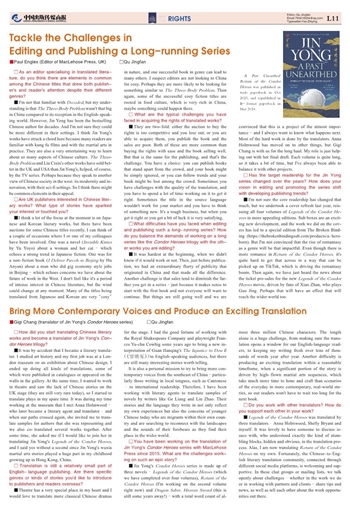■Gigi Chang (translator of Jin Yong's Condor Heroes series)□Qu Jingfan
□How did you start translating Chinese literary works and become a translator of Jin Yong's Condor Heroes trilogy?
■It was by accident that I became a literary translator. I studied art history and my first job was at a London museum on an exhibition about Chinese design. I ended up doing all kinds of translations, some of which were published in catalogues or appeared on the walls in the gallery. At the same time, I wanted to work in theatre and saw the lack of Chinese stories on the UK stage (they are still very rare today), so I started to translate plays in my spare time. It was during my time working at the museum that I met Anna Holmwood–who later became a literary agent and translator–and when our paths crossed again, she invited me to translate samples for authors that she was representing and we also co-translated several works together. After some time, she asked me if I would like to join her in translating Jin Yong's Legends of the Condor Heroes, and I said yes without a second since Jin Yong's wuxia martial arts stories played a huge part in my childhood growing up in Hong Kong, China.
□Translation is still a relatively small part of English-language publishing. Are there specific genres or kinds of stories you'd like to introduce to publishers and readers overseas?
■Theatre has a very special place in my heart and I would love to translate more classical Chinese dramas for the stage. I had the good fortune of working with the Royal Shakespeare Company and playwright Frances Ya-chu Cowhig some years ago to bring a new interpretation of Guan Hanqing's The Injustice to Dou E (《窦娥冤》)to English-speaking audiences, but there are still many interesting stories worth telling.
It is also a personal mission to try to bring more contemporary voices from the southeast of China–particularly those writing in local tongues, such as Cantonese–to international readership. Therefore, I have been working with literary agents to translate samples of novels by writers like Ge Liang and Lin Zhao. Their stories and the language they write in not only reflect my own experiences but also the concerns of younger Chinese today who are migrants within their own country and are searching to reconnect with the landscapes and the sounds of their forebears as they find their place in the wider world.
□You have been working on the translation of Jin Yong's Condor Heroes series with MacLehose Press since 2015. What are the challenges working on such an epic story?
■Jin Yong's Condor Heroes series is made up of three novels–Legends of the Condor Heroes (which we have completed over four volumes), Return of the Condor Heroes (I'm working on the second volume right now) and Dragon Sabre, Heaven Sword (this is still some years away!)–with a total word count of almost three million Chinese characters. The length alone is a huge challenge, from making sure the translation opens a window for our English-language readers, to keeping my writing fresh over tens of thousands of words year after year. Another difficulty is producing an exciting translation within a reasonable timeframe, when a significant portion of the story is driven by high-flown martial arts sequences, which take much more time to hone and craft than scenarios of the everyday in more contemporary, real-world stories, so our readers won't have to wait too long for the next book.
□Do you work with other translators? How do you support each other in your work?
■Legends of the Condor Heroes was translated by three translators–Anna Holmwood, Shelly Bryant and myself. It was lovely to have someone to discuss issues with, who understood exactly the kind of stumbling blocks, hidden and obvious, in the translation process. Alas, I am now translating Return of the Condor Heroes on my own. Fortunately, the Chinese-to-English literary translation community, connected through different social media platforms, is welcoming and supportive. In these chat groups or mailing lists, we talk openly about challenges–whether in the work we do or in working with partners and clients–share tips and news, as well as tell each other about the work opportunities out there.


